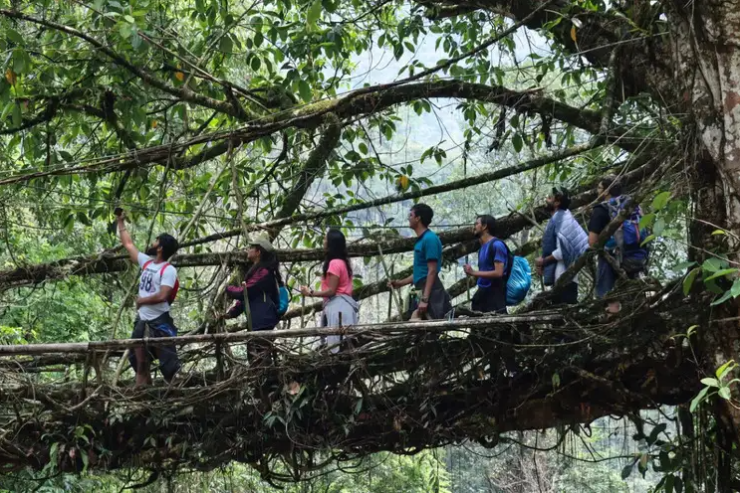Adventure travel has become one of the fastest-growing sectors in the global tourism industry. In a world where people are constantly seeking new experiences, adventure travel offers the perfect blend of excitement, challenge, and discovery. Whether it's scaling a mountain, navigating remote jungles, or exploring far-flung deserts, adventure travel appeals to those who want to break free from the conventional and dive into the unknown. With the rise of social media and the growing desire for unique experiences, more travelers are pushing the boundaries of traditional tourism and embracing adventure like never before.
The mission uncrossable concept, which focuses on overcoming difficult and extreme challenges, has also sparked interest among travelers seeking once-in-a-lifetime experiences. This type of travel often involves venturing into less explored destinations, where the journey itself is just as important as the destination. In this article, we will explore the rise of adventure travel, the different types of experiences it offers, and the reasons behind its growing popularity. We'll also examine the benefits and challenges of adventure travel and what the future of this exciting trend holds.

What is Adventure Travel?
Adventure travel refers to any form of tourism that involves exploration or travel to remote or exotic destinations, where travelers engage in physical activities that are both exhilarating and sometimes physically challenging. Unlike traditional forms of tourism, which may focus on relaxation and sightseeing, adventure travel emphasizes outdoor activities, self-discovery, and the thrill of overcoming obstacles. This type of travel often includes activities like hiking, trekking, rock climbing, kayaking, mountaineering, and wildlife safaris.
The definition of adventure travel can vary depending on an individual's interests and physical capabilities. For some, a simple hiking trip in the mountains might be considered an adventure, while others might prefer more extreme activities like white-water rafting or trekking across frozen tundras. Adventure travel is also about immersing oneself in unfamiliar cultures, learning about local traditions, and connecting with nature in a way that typical vacation experiences do not allow.
The Growth of Adventure Travel
In recent years, adventure travel has witnessed significant growth, driven by several key factors. One of the most important drivers is the increasing desire for authenticity in travel. Many modern travelers are no longer content with typical tourist experiences; they want to engage with the local culture, explore untouched landscapes, and push themselves out of their comfort zones. This desire for authenticity has led people to seek out destinations and activities that offer a deeper connection to the environment and culture.
Another significant factor contributing to the rise of adventure travel is the advent of social media. Platforms like Instagram, Facebook, and YouTube have allowed travelers to share their experiences with a global audience, inspiring others to embark on similar journeys. Stunning photographs and videos of exotic destinations, thrilling adventures, and personal achievements have motivated more people to try adventure travel for themselves. Social media has turned what was once a niche form of travel into a mainstream trend.
Furthermore, the rise of affordable travel options has made adventure travel more accessible than ever before. Budget airlines, cheaper accommodation, and the availability of various travel packages have allowed people from different walks of life to pursue their travel dreams. The increasing number of adventure travel companies offering guided tours, expert advice, and customized itineraries has made it easier for individuals to embark on challenging journeys, even if they lack experience.
Types of Adventure Travel Experiences
Adventure travel encompasses a wide range of activities, each offering its own unique challenges and rewards. Here are some of the most popular types of adventure travel experiences:
Trekking and Hiking
One of the most popular forms of adventure travel is trekking and hiking, which involves exploring remote mountains, forests, and valleys. Whether it’s hiking through the Himalayas, trekking to the Machu Picchu ruins, or exploring national parks, hiking allows travelers to experience nature up close and challenge themselves physically. Many trekking routes, such as the Inca Trail in Peru or the Mount Kilimanjaro climb in Tanzania, offer an opportunity to push one’s limits while witnessing breathtaking landscapes.
Wildlife Safaris
For those interested in wildlife, safaris offer a thrilling adventure into some of the world’s most exotic locations. From the vast plains of Africa to the dense jungles of South America, safaris provide an up-close look at wildlife in their natural habitats. Whether it's tracking lions in the Serengeti, observing elephants in Botswana, or spotting rare birds in the Amazon rainforest, safaris are a unique way to explore the wild and engage in eco-tourism.
Water Sports and River Adventures
Water-based adventures such as kayaking, white-water rafting, and scuba diving have also become increasingly popular. These activities not only allow travelers to experience nature from a different perspective but also offer an adrenaline rush as they navigate rapids, dive into coral reefs, or swim with marine wildlife. Destinations like the Grand Canyon (for rafting), New Zealand (for kayaking), and the Great Barrier Reef (for diving) have become iconic adventure spots for water enthusiasts.
Extreme Sports
For the more daring, extreme sports such as bungee jumping, skydiving, and paragliding provide a rush of adrenaline and an unforgettable experience. These activities allow adventurers to step outside of their comfort zones and face their fears head-on. Extreme sports are often combined with scenic views, making them even more thrilling and rewarding.
Cultural Immersion and Expeditions
Adventure travel isn’t just about physical challenges; it’s also about cultural immersion and exploring different ways of life. Expedition-style travel, which includes journeys to remote regions like the Antarctic, the Amazon, or the Sahara Desert, offers travelers the chance to experience some of the world’s most untouched cultures and environments. Whether it’s spending time with indigenous communities, exploring ancient ruins, or living off the grid, cultural expeditions offer a deeper understanding of the world.
The Benefits of Adventure Travel
Adventure travel offers numerous benefits that go beyond simply visiting new places. For one, it provides an opportunity to step outside of everyday routines and break free from the stresses of modern life. Traveling to unfamiliar locations and participating in physical challenges allows individuals to gain a fresh perspective on life and develop resilience, confidence, and a sense of accomplishment.
Adventure travel also promotes personal growth and self-discovery. The challenges faced during adventurous trips often require individuals to push their limits, learn new skills, and adapt to new environments. These experiences foster a sense of achievement and can have long-lasting positive effects on an individual's mental and emotional well-being.
Moreover, adventure travel contributes to physical health by encouraging physical activity and outdoor exploration. Whether it’s hiking, biking, or swimming, the physical activity involved in adventure travel helps improve cardiovascular health, stamina, and overall fitness.
The Challenges of Adventure Travel
Despite its many benefits, adventure travel does come with its own set of challenges. The most obvious challenge is safety. Many adventure activities involve a certain level of risk, especially in extreme environments. Travelers must take precautions, such as hiring professional guides, using proper equipment, and ensuring that they are physically prepared for the challenges they will face.
Another challenge is environmental impact. While adventure travel often promotes eco-tourism, some activities can contribute to environmental degradation if not managed responsibly. For example, increased foot traffic in popular trekking areas can lead to soil erosion, littering, and damage to local ecosystems. It is crucial for adventure travelers to be mindful of their environmental footprint and choose eco-friendly options that support sustainable tourism practices.
Additionally, cultural sensitivity is important when engaging with local communities. Adventure travelers must respect local traditions and customs and be mindful of their impact on the communities they visit. Sustainable and responsible travel practices should always be a priority to ensure that adventure travel benefits both the traveler and the destination.
The Future of Adventure Travel
The future of adventure travel looks promising, with more people seeking unique and transformative experiences. As technology continues to improve, virtual reality (VR) and augmented reality (AR) may allow travelers to explore destinations and try adventure activities in a virtual setting before they embark on the actual journey. This could open the doors for even more adventurous experiences in previously inaccessible locations.
Furthermore, as the demand for sustainable and responsible travel grows, adventure travel companies will need to adopt eco-friendly practices and focus on preserving natural habitats, wildlife, and local cultures. The integration of technology with adventure travel will also continue to evolve, with apps and platforms offering travelers enhanced tools for planning, booking, and sharing their experiences.
Conclusion
Adventure travel offers a unique opportunity for individuals to explore new frontiers, connect with nature, and push their limits. As the popularity of adventure travel continues to rise, it is important for travelers to approach these journeys with responsibility, respect, and sustainability in mind. By embracing adventure travel, individuals can experience personal growth, contribute to the preservation of the planet, and create memories that will last a lifetime. The future of adventure travel is bright, offering endless possibilities for discovery, exploration, and transformation.










Comments